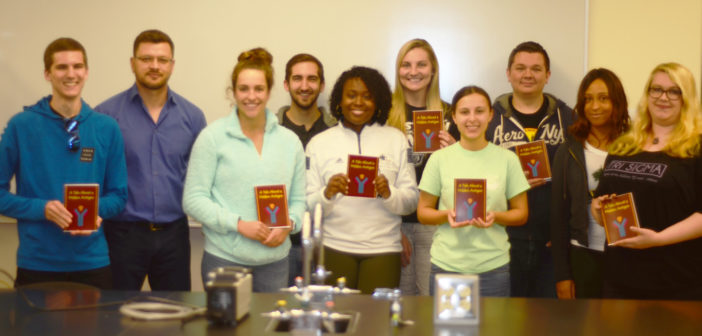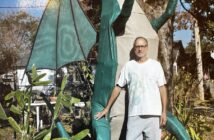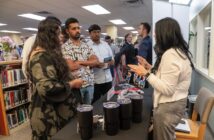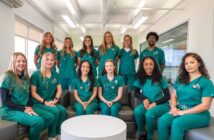[tribulant_slideshow gallery_id=”253″]
Two Classes create Textbooks for their Studies
With six weeks on the spring 2018 calendar already marked off for University Campus students, fall 2017’s Immunology and Academic Writing I students are still left lauding the accomplishments of last semester.
The fall semester 2017 Immunology course under the tutelage of Dr. Sergiy Borysov, associate professor of Biology, created a text from which future students could draw insight and understanding on the course titled, “A Tale About a Hidden Antigen.”
The students took part by compiling different topics related to Immunology and synthesizing them in a way that the layman and the Biology novice would understand relatively quickly. Borysov touted the experience as wonderful, as he allowed the students to express themselves along an analogous line of understanding. The students decided to focus on the story of an antigen, (Bactisha) and her journey throughout “Bodyville” a fictitious kingdom personifying the human body. Throughout the tenure of Bactisha’s expedition, the reader is entreated to learning critical components of the Immunological parts of the human body.
The student team was assisted by Dr. Thomas Ricard, assistant professor of Engineering and Physical Science, who proofed the document. Ricard stated that this method of learning could be transferred to different fields that require memorization and retention like Engineering and Physics. Ricard stated this was his first time editing, but despite the heavy concepts behind the story, it was “personified in a way that we all can mutually understand.”
Drs. Borysov and Ricard released a statement on their study which reports, “One of the most difficult aspects of teaching a subject comprehensively is getting the students through the process of a higher cognitive activity, beyond memorization of basic relevant facts. A basic working vocabulary and knowledge of a set of facts are essential for a student to truly understand and communicate the details of his or her chosen profession.”
They continued, “To solidify learned material in students’ minds, higher levels of cognitive involvement are necessary. More complex levels of cognitive activity include application, analysis, and synthesis. The study of the biological sciences presents challenges not only in the quantities of terms to memorize, but – more importantly – in the amount of complex concepts and processes to understand. Many biological processes can be intimidating, boring, and discouraging to students. Here we are offering one idea on how to engage students into studying course material on a higher cognitive level.”
No doubt the group collectively shared Ricard’s and Borysov’s thoughts, expressed by junior, biomedical science major Kaitlyn McWilliams responsible for the illustrations in Chapter 3, who stated “That class was one of the [most fun]science classes I’ve had. Everything about the course was very useful, and it stuck with me!” McWilliams said, “It was a lot of fun to take what I’ve learned and form it into something silly and fun that still makes sense!” McWilliams’ statement typifies that of someone who has bought into the learning experience, notwithstanding the increased difficulty of this particular course which was made easier by the initiative of creating this book.
Supplementary to McWilliams’ thoughts, Dr. Mary Spoto, Dean of the School of Arts and Sciences, relayed the fact that she was not surprised as there is a lot of creative teaching and active learning being undertaken between faculty and students in the school.
Spoto stated, “We do a lot of active learning, where students take center stage in learning, working with technology, groups, and in the field, practicing.” Spoto mentioned, “How do you take a really complex concept and translate it in a way that makes it accessible? Besides being a great tool for student learning, it also demonstrates that the students who wrote it and illustrated it, get it.”
These sentiments continued to reverberate as Kali Thompson, junior, biology major stated, “The book has helped me understand the concepts of Immunology on a molecular level.”
This was not the first undertaking by Borysov to transfer his classroom into something different. Spring 2017 found Borysov changing his final examination and class presentations into what was called the Bio-Oscars which involved giving trophies to the best video presentation, voted on by their peers.
However, these techniques are not exclusive to science-based professors, Dr. Christopher Friend, assistant professor of English, is currently working on an extremely ambitious undertaking by producing a textbook for English 121: Academic Writing I. The process began in fall 2017 with the Honors section for Academic Writing. Friend said his thoughts were, “What would happen if we created our own textbook instead of having to buy someone else’s?”
Friend provided the class with free and open text sources which they taught each other and wrote a chapter for, with the information they had responsibility for. The net effect of the project was, “It dramatically increased student buy-in for the content we were working through because the students realized that it was their responsibility to learn it and understand it well enough to teach it to other people. And they understood that it was going to make its way into a book that was potentially going to be used by every student who goes to Saint Leo,” Friend Said.
Alexa Klein clinical psychology major, and Brandi Bain, global studies major, were a part of the fall 2017 class that began the book.
“At first I was very uneasy about it because I was like whoa we’re going to create a textbook as opposed to getting one,” Klein said. Bain echoed similar sentiments stating that her initial thought was, “How is our class of about 20-ish kids going to create a textbook?”
In the end, Klein stated that they were using more of their critical thinking skills and rhetorical reading along with other tools, becoming more confident in those abilities because they were teaching versus reading what others wrote. Bain added that working with others made correlation of data easier as hyperlinks were embedded in the shared document that would link one group of authors’ work to the next.
The content of the book was produced successfully, however, still needs polishing. Despite this, Friend and the now Academic Writing II class are working on content for this semester’s book. Dr. Friend is hopeful that the raw data can be sent to a professional editing course that would then create another tier of the book’s production.
The School of Arts and Sciences continues to produce new and innovative ways of teaching at Saint Leo University, which have included the spring microbiology course that mirrors The Ellen DeGeneres show crossed with Dr. House parody in evaluating illnesses, the perpetual science café showcase, and the year-long ‘60s themed celebration under the banner Revolution! The theme commenced Sept. 2017 with Flower Power taking over the café and will culminate with a multimedia event in the BlackBox Theatre at the end of this semester.
The School of Arts and Sciences hopes to connect with not only students but also the entire Saint Leo community. “We would like to give students and the community an opportunity to learn inside and outside the classroom,” Spoto said. Be sure to look out for information regarding the ’60s themed events.





